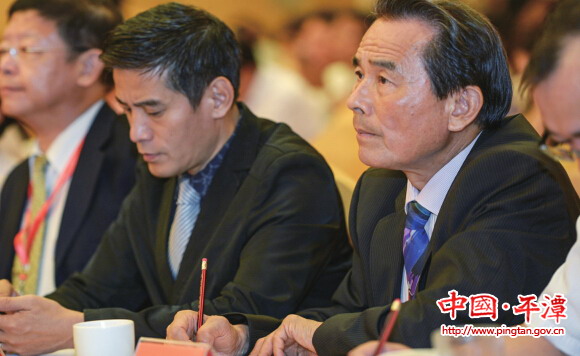

The fourth “Common Homeland” Forum was convened in the Pingtan Comprehensive Pilot Zone (PCPZ) in Fujian province on June 15.
 |
|
Experts attend the fourth “Common Homeland” Forum in Pingtan, Fujian province, June 15. [Photo/pingtan.gov.cn] |
As part of the Straits Forum, this year’s “Common Homeland” Forum attracted more than 60 media outlets and some 300 politicians, entrepreneurs and scholars from across the Taiwan Straits to discuss innovation and development in the Fujian Pilot Free Trade Zone (FTZ).
The Fujian FTZ was officially inaugurated on April 21. It covers 118 sq km in Pingtan (43 sq km), Xiamen (43.78 sq km), and Fuzhou (31.26 sq km), and seeks greater cross-Straits cooperation with Taiwan.
Seven scholars and experts delivered speeches on Monday on topics ranging from Pingtan’s development to cross-Straits cooperation. The followings are their takeaways:
Xu Zhenming (Professor at Economics Dept of Taiwan University):
Pingtan was designated an experimental zone for cross-Straits cooperation in 2011 with even more preferential policies than special administration zones. Now building on the achievement and its connection with Taiwan, Pingtan should strive to become a free trade port and a regional financial center.
The key to a free trade port is to ease up rules on investors and allowing them to enter more sectors. Pingtan should also promote duty-free policies in order to become an offshore financial center.
More specifically, Pingtan can push for more cooperation with Taiwan in finance based on the Economic Cooperation Framework Agreement (ECFA). That would allow Taiwan investors to tap into the logistics market and provide complete financing service for all enterprises.
Lin Jianfu (Director of Taiwan Institute of Economic Research):
The FTZ is of great significance to cross-Straits development. Given Pingtan’s proximity to Taiwan and the sound relations they have fostered over the past few years, no doubt the two sides should increase communications in the future, taking advantage of the mainland’s Road and Belt Initiative and Asian Infrastructure Investment Bank.
Fujian FTZ and Taiwan can make a much more powerful team influencing the economic development of the whole Southeast Asian region. To realize that, the two sides need to help their enterprises go global while attracting more foreign investment.
Fujian and Taiwan can carry out joint pilot reforms in investment management, export-oriented economy, trade facilitation and financial openness, lowering the threshold of finance, shipping, commerce, telecommunications and other sectors and piloting two-way overseas RMB loans.
Pingtan and Taiwan, driven by the concept of “Common Homeland”, can get down to the service industry while promoting cooperation in education, cultural creativity, finance and online business, to make young Taiwan people feel home in Pingtan.
Huang Jianzhong (Dean of School of International Economy and Trade of the the Shanghai University of International Business and Economics):
Service outsourcing and e-commerce are the two most important industries in the FTZ because they can increase the productivity of the service industry. They have won endorsements from the central authorities, who have released policies promoting the businesses for the last two years. I think Pingtan can attach more importance to them, too.
To develop the two industries, Pingtan should work with Taiwan to enhance related infrastructure and attract more professionals while expanding markets in the mainland.